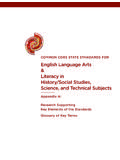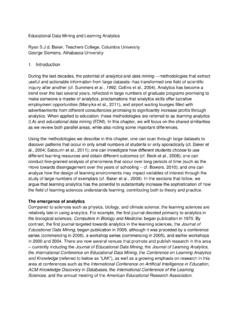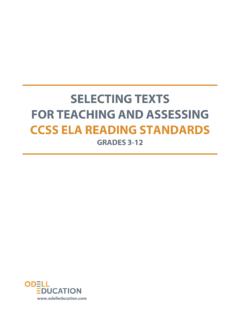Transcription of Morphological strategies training: The …
1 Griva, E., & Anastasiou, D. (2009). Morphological strategies training : The effectiveness and feasibility of Morphological strategies training for students of English as a foreign language with and without spelling difficulties. Journal of Writing research , 1(3), 199-223. Contact and copyright: Earli | Dimitris Anastasiou, Department of Primary Education, University of Western Macedonia, Greece | Morphological strategies training : The effectiveness and feasibility of Morphological strategies training for students of English as a foreign language with and without spelling difficulties Eleni Griva & Dimitris Anastasiou University of Western Macedonia | Greece Abstract: The aim of this study was primarily to investigate the effects of Morphological strategies training on students with and without spelling difficulties in English as a foreign language (EFL), but also to assess the feasibility of Morphological strategies training in a classroom context.
2 The intervention was piloted in the sixth grade of a Greek primary school: 23 Greek speaking students, aged 11-12, were assigned to the treatment group receiving explicit teaching on inflectional and derivational morphemic patterns of English words. The control group, composed of 25 Greek speaking students of the same age, attending a different classroom of the same school, was taught English spelling in a conventional (visual-memory based) way. Both quantitative and qualitative methods were employed to gain insights: a pre- and post-test, an observation schedule, a student questionnaire and a teacher interview. The pre- and post-test results indicated that the metamorphological training yielded specific effects on targeted morpheme patterns.
3 The same results were obtained from a sub-group of nine poor spellers in the treatment group, compared to a sub-group of six poor spellers in the control one. The observation data revealed that the metamorphological training promoted students active participation and the questionnaire data indicated that students got satisfaction from their training . Finally, interview data highlighted that teachers considered the intervention as a feasible way of improving students Morphological processing skills in spelling. Keywords: Morphological strategies training , EFL students, spelling intervention, spelling difficulties GRIVA & ANASTASIOU Morphological strategies training | 200 1.
4 Introduction Until recently, spelling, compared to reading and oral skills, was a rather neglected area of psycholinguistic research . That was probably because spelling had been regarded as a school subject or as a pure conventional aspect of written language rather than an area for scientific investigation (Perfetti, 1997). However, a strong psycholinguistic dimension to spelling has been revealed (see Treiman, 1993) and in the past decade there has been a keen interest in researching students spelling development and difficulties as well as spelling instruction. The importance of phonological processing skills to the acquisition of spelling, especially in the first stages of spelling development , has been well established (Bryant, Maclean, Bradley, & Crosland, 1990; Muter & Snowling, 1997; Torn us, 1984; Treiman, 1993, 2000).
5 To spell an unknown word, a child would have to be able to segment an oral word to its phonemes (Ball & Blachman, 1988; Byrne, & Fielding-Barnsley, 1989; Cataldo & Ellis, 1990), and to know how the letters represent each phoneme (Byrne & Fielding-Barnsley, 1989; Caravolas, Hulme, & Snowling, 2001; Treiman, 2000). Letter knowledge is another predictive factor for spelling development in alphabetic scripts (Byrne & Fielding-Barnsley, 1989; Share, Jorm, MacLean, & Matthews, 1984). Moreover, orthographic knowledge , that is the ability to understand orthography and its constraints ( , the unacceptable letter sequences), is instrumental in spelling development (Brown & Ellis, 1994; Caravolas, Hulme, & Snowling, 2001; Snowling & Hulme, 1991; Treiman, 1993).
6 However, English orthography is not straightforward phonemic transcription of speech (Ehri, 1989). Compared to other alphabetic scripts, such as Finnish ( ller & rady, 2001), Serbo-Croatian (Lucatela, Lucatela, Carello, & Turvey, 1999), Turkish ( ney & Durguno lu, 1997), and Italian (Cossu, Gugliotta, & Marshall, 1995), English orthography is considered as opaque or deep during the reading and spelling process, as grapheme-phoneme relationships contain many inconsistencies and irregularities. Comparatively speaking, during the reading process, the Greek orthography has been found to be shallow or transparent (Porpodas, 1999; Seymour, Aro, & Erskine, 2003).
7 But during the spelling process, the Greek orthography can be characterized as rather opaque, since there is more than one letter corresponding to one phoneme; thus spelling quite often is not directly predictable from phonology (Petrounias, 1993). Although English orthography is based on alphabetic principles, there is not always a reliable and consistent way of matching phonemes to letters, and vice versa. The same letters often represent different phonemes and the same phonemes often are transcribed by different letters (Fowler & Liberman, 1995). This usually happens because English orthography, apart from phonological information, carries a large amount of Morphological information.
8 Consequently, children need to discover the internal Morphological structure of the words in order to master spelling. 201 | JOURNAL OF WRITING research Especially in the middle stages of spelling development , correct spelling involves awareness of the Morphological components of words (Henderson, 1985; Ehri, 1986). Carlisle (1995) asserted that Morphological awareness focuses on children s conscious awareness of the morphemic structure of words and their ability to reflect on and manipulate that structure (p. 194). In other words, Morphological awareness refers to the ability to explicitly understand the smallest meaningful components of the words (morphemes).
9 In a broader sense, Morphological awareness includes the manipulation of morphemes, which are the smallest units of meaning and can be either free or bound. Free morphemes can be individual words ( eye, wife, believe). Bound morphemes cannot stand alone as words but they have to be combined with other morphemes in order to make sense or to modify the meaning of a word. Bound morphemes can be either prefixes ( de-, ex-, in-, intra-, sub-, un-), or suffixes (-er, -or, -tion, -ness, -y, -ful, -able, -ly) (Bauer, 1988; Carstairs-McCarthy, 2002; Moats, 2000). Morphological awareness insights in English can be prevented mainly because of phonological changes in root morphemes when adding derivation and inflexion morphemes ( decide and decision, loaf and loaves) in oral language, and partly because of unclear boundaries among morphemes ( bake and baking, heavy and heavier) in written language.
10 This causes confusion and difficulties for L1 Greek students, who learn English as a foreign language. The allomorphs of English plural morphemes ( churches, dogs, fans), which are phonologically conditioned allomorphs, can also cause problems to Greek students. Similarly, so can the allomorphs of past tense morpheme ed in some English words ( walked, bagged, robbed). In addition, students can face difficulties with some morphologically conditioned allomorphs such as perceive, perception, perceptive. Morphological information processing is defined as the ability to apply knowledge of morphology both to listening and reading comprehension as well as spelling.






